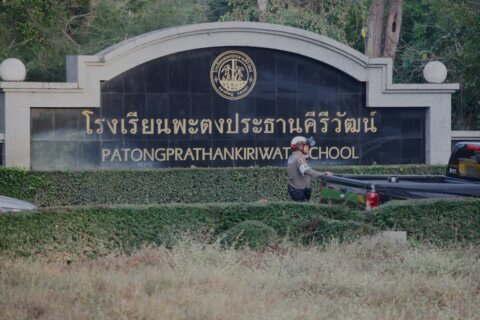





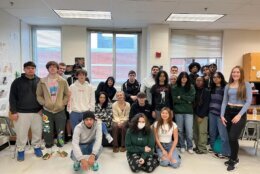
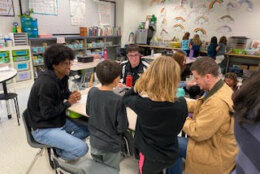
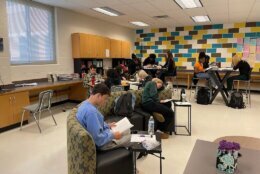
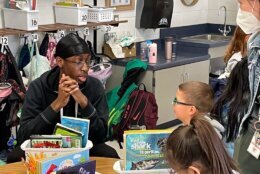
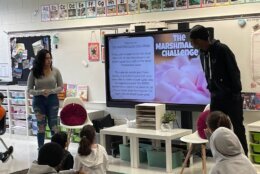

A few years ago, Douglas Fulton, who was principal of Freedom High School in Loudoun County, Virginia, at the time, was concerned about some senior students who seemingly didn’t have a plan for life after graduation.
His focus was on two students in particular, who counselor Colleen Hurley said were in jeopardy of not graduating. So, he recommended teachers come up with project-based assessments for the students to be able to finish the year.
One of the students “really thrived with it,” Hurley said, prompting Fulton to consider whether the model could be effective on a wider scale. That idea turned into the school’s Leadership Academy, which for the last four years has offered real-world mentors and specialized classes to students unsure of their plans after graduation.
The academy prioritizes project-based learning and uses coursework in math, business, English and U.S. government as a framework. In Loudoun County last year, almost 82% of seniors planned to attend two- or four-year colleges after graduating. But for those whose plans aren’t as clear, the academy provides an opportunity to experiment with potential career paths.
“High schoolers face the challenge of having to know what they’re going to do in life,” said Beth Visna, a teacher at Freedom High. “And that’s a lot of pressure, because there are plenty of adults that don’t necessarily know what they would like to do in life.”
Every year, the school’s guidance counselors and some teachers recommend students who they think would benefit from participating in the program. About two dozens rising seniors are usually selected from the nominations — 54 students were nominated to participate next year.
Real-life projects, Visna said, aim “to get them exposure to things that they might not [get] in traditional classes.” Students also participate in a number of field trips, including one to nearby Liberty Elementary. Student Angie Hoang said one project with the elementary students was a marshmallow bridge challenge, in which the kids had to see how tall of a tower they could make.
One of the academy’s key elements is its mentorship program. The students began the process of six virtual meetings with their career mentors in March. Sharon Wright, vice chair of the school system’s School-Business partnership, works with teachers to match students with their mentors.
“We have someone who’s working with a pilot, we have several small business owners,” Visna said. “We have several entrepreneurs. We have tattoo artists, military education. We had a third grade teacher this year, [an] EMT.”
Hayder Hamzah was matched with an EMT from West Virginia. He said before joining the academy, he didn’t have a clear idea of what he wanted to do after graduating.
“After a few sessions with her talking, and she showed me around, now I definitely have an idea of what I want to do, and I want to pursue it,” Hamzah said. “I don’t think it would have been possible without this class.”
At the beginning of the year, Marynez Garcia said she thought she wanted to become a teacher. But now, she’s considering other alternatives, in part because of the guidance from her mentor, Erica Rowe, founder and CEO of Business Brand Ambassador.
Rowe, Garcia said, “helps me a lot with customer service, and just being confident and doing anything that you can do.”
As part of the academy, all of the students also have to apply to Northern Virginia Community College or a four-year university, and take the ASVAB test, even if they don’t intend to enlist in the military. That motivated Sidikie Bayoh to get his essays done.
“If we didn’t do it in this class, I don’t think I would have gotten it done,” he said. “This class really helped a lot, because I probably would have forgotten about it, and it would have been a big burden to me later on.”
The college application process also helped Zarina Iryukova, because “since I was still learning English, I didn’t know how to apply for all classes, and which classes I need to have to major in IT.”
As part of their coursework, the students also learn about taxes and what goes into an effective resume. A recent exercise tasked them with figuring out how to set a budget. Some of the presentations included in the English class have been valuable for Xander Josselyn, who said “it’s slowly gotten me to not be as shy.”
Visna and Hurley said the program has been effective in helping students pave a path, and has served as a model for similar efforts elsewhere in the county.
Next week, the students’ efforts culminate with a banquet, which their parents and mentors are invited to attend.
“Postsecondary planning is not a one size fits all,” Hurley said. “We need to meet every single student where they are, taking into account some of the things happening in their lives on a day-to-day basis, and maybe some of the constraints that they feel might be obstacles in the future.”



